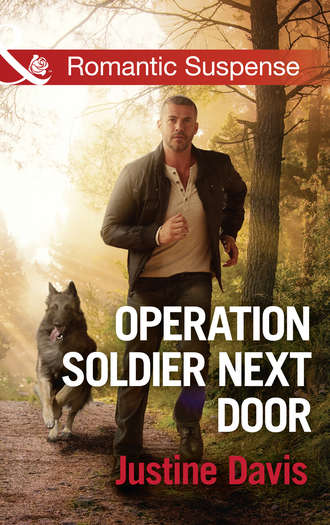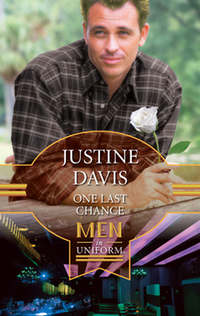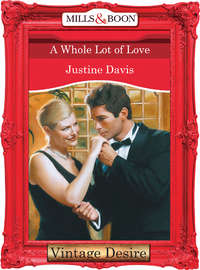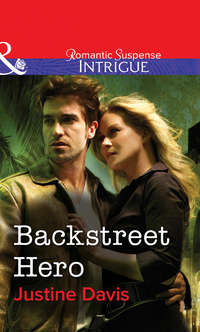
Полная версия
Operation Soldier Next Door
The man drew back. And Lacy saw that Quinn Foxworth was frowning, as well—although clearly not surprised that his dog had apparently provided a major clue to the cause of this middle-of-the-night chaos.
“Those things don’t blow up easily,” he said.
The chief nodded. “Not without a leak and some pretty extreme heat.”
“The arson guys and the lab’ll have to figure it out.” The man grimaced. “Maybe in a month, if we’re lucky. They’re pretty backed up.”
“I’ve got some friends with access to the fed’s lab, if that’ll help,” Quinn said, and Lacy guessed his tone was purposefully neutral.
Lacy saw the chief’s gaze shift to Quinn. “Heard about you Foxworth folks. Word is you know what you’re doing and you don’t get in the way.”
“A reputation we’ve worked hard to build,” Quinn answered.
“Brett Dunbar’s a friend of mine,” the man said.
Quinn smiled. Widely. “And of ours. A good friend. As is his girlfriend.”
Both men nodded, connections established. Lacy was pondering the interesting way things worked when something occurred to her.
“I saw someone out here, just after midnight,” she said. “I was up reading, and when I turned out the light I looked outside and saw someone in the yard.” She glanced at Tate. “I thought it must have been you, still getting settled in.”
He shook his head, and finally spoke.
“It wasn’t me. I was tired, crashed early. And my grandfather,” he added, “would never keep a leaking propane tank, even a small one.”
The chief considered that for a moment. “When was the last time you saw him?”
Tate grimaced. “A while before my last deployment. So a couple of years ago.”
Lacy bet he wished he’d had a chance to say goodbye. She felt awful for him, but glad for Martin that the illness that had taken him had been quick. He would have wanted it that way.
“How did he seem?”
“Fine. Like always.”
“How old was he?”
Lacy realized where the man was going, and hastened to head him off. “Martin McLaughlin was sharp as a tack until the very end. We should all be so clearheaded and active now, let alone at ninety-three.”
The chief shifted his attention to her. “You knew him?”
“Yes. I was there, and talked with him barely an hour before he passed, and he was still mentally together.”
Tate went very still. “You were...with him?”
She glanced at him. “Yes. Your father hadn’t arrived at the hospital yet and I didn’t want Martin to be alone.”
He stared at her silently. In the morning light she realized his eyes were a greenish hazel, like his grandfather’s. The moment stretched, the voices of the others as they discussed the situation fading out somehow. Only when she sucked in a deep gulp of air did she realize she had actually stopped breathing.
“—to board up that hole when we’re finished, if you’ve got something we can use,” the chief was saying.
Tate shook his head, as if he were still fuzzy.
Or as if he’d been as caught by that long moment as she had been.
“I’ll handle it,” he said. It sounded automatic, as if it were a standard response. As if whatever it was, he was used to handling it.
“I’ve got some panels from my greenhouse you could use temporarily,” she said. “I think a couple of them would cover that gap. That and a tarp for the roof would keep the wildlife out, at least.”
His mouth twisted ruefully. “I’ll take the local raccoon over scorpions.”
She made a face. “I think I’d take anything with fur over scorpions.”
He gave her a fleeting smile. Definitely improving, she thought. “Speaking of fur,” he said, looking at Quinn, who in turn was studying him assessingly, “that’s quite a dog. Yours, I assume?”
“My wife’s first,” he said, “but now, yes.”
“Interesting that he headed for an explosion.”
Lacy hadn’t thought of that, but he had a point. Her mother’s ball of fluff would still be cowering under the bed.
“To be expected, once you get to know him,” Quinn said.
“And finding the cause of explosions?” She might just have met him, but she could tell Tate McLaughlin had an idea in his head.
“That, in particular, is a new one to me,” Quinn answered, “but again, knowing him, not surprising.”
“He looks too young to be retired. But he acts trained.”
So that was it. He was wondering if the dog had been a working dog, military or police, she guessed.
“Don’t know. He just showed up on Hayley’s doorstep one day and stayed. So while I wish I could take the credit,” Quinn said with a grin, “he came that way. I’ve only fine-tuned what was already there. He’s a wonder, that dog.”
Lacy couldn’t argue with that. But it wasn’t the finding of the cause of the explosion she was thinking of.
She was thinking of those moments when the dog had somehow managed to make Tate McLaughlin do what he needed to do—sit down. When the man had responded to the dog in a way he didn’t to the sudden influx of concerned neighbors.
If the animal hadn’t been trained as a therapy dog, he surely had the instincts.
And it appeared her new neighbor just might need that kind of help.
Chapter 3
As he stood in the bedroom doorway, surveying the damage after the fire department had finally cleared out, Tate rubbed a hand over the back of his head. His fingertips instinctively traced the scar that thinned out and stopped an inch or so into his hairline. It wasn’t even tender anymore, and the occasional headache and stiffness in his back were the only lingering aftereffects of that bloody day.
He’d not only been lucky that Sunny had been with him that day, he’d been lucky that Lori Collins, the best damned medic he’d ever served with, had been on duty at the aid station when he’d been brought in. Otherwise he might well be dead instead of back home, relatively intact. If he kept to his physical therapy regimen, he’d be in a lot better shape than many.
His mind skittered away from the memory of two funerals, funerals he’d missed because even though he was stateside, he was still in the hospital. He still felt guilty about that, although he’d done what he could when he was released. He had visited each family of his fallen brothers, shared stories of their talks about home and family, and assured them all of the love their lost ones had for them. It was all he could think of to do, but when he left he felt sadly inadequate. He was still alive, and they would never see their sons, brothers and husbands again.
Survivor’s guilt, they’d told him. He supposed it fit. He’d survived, and sometimes he felt damned guilty about it. Guilty enough that while he was in the hospital he’d seriously thought about trying to re-up when his active duty period ended. But then Gramps—
“RPG?”
Quinn Foxworth’s voice came from close enough behind that it startled him. He turned, looked at the man. Saw he was looking not at the smoldering ruin but at his scars. Normally this would have bothered him, but what he saw in that steady gaze told him this man understood.
“IED,” he answered.
“Sucks.”
Tate nodded. “You’ve been in the sandbox.”
“Not lately. Thank God.” He looked at the hole in the wall of the house. “No wonder this got your attention.”
“Rattled my cage, that’s for sure,” he admitted. Somehow it was easier, with someone who knew.
“You’re lucky it wasn’t worse. And that you weren’t injured worse.”
Tate knew it was true. “I wasn’t in there. I sat down on the couch in the living room last night, and that’s the last I remember until it happened.”
“Still bothers me, that tank,” Quinn said. “It’s not just unusual, it’s darned hard to get one of those to blow.”
Tate looked back toward where the dog had led the firefighter to the source of the blast. “Welcome home,” he said, his mouth twisting.
He wasn’t feeling bitter, but knew he could without much effort. More than one of his buddies who’d come back before him warned him about that, that the everyday problems of life back home could seem either petty or insurmountable, making you ignore them and thus they got worse, or turn bitter because you felt like you’d paid enough already and deserved some smooth sailing.
Tate hoped he was tough enough not to go that route. And he had Gramps’s example to follow, the man who had come home from a long, ugly war with a trunk full of medals, citations and commendations, but had put them in the past and built a full, normal life back home.
“You need a place to regroup?” Quinn asked.
“No,” Tate said instantly, and more gruffly than he should have. But he knew that while he’d been shaken by the explosion in the darkness, it wasn’t that bad. He had too many brothers in arms diagnosed with PTSD to compare to, and was more than grateful he wasn’t one of them. Since this last injury, he’d felt only a bit numb to life in general. They told him that would pass. He wasn’t so sure.
“I’ll bunk in the shop for now, until I can get the repairs done,” he said, regretting the sharpness in his first response.
Quinn seemed to understand.
“Keep it in mind. We’re just around the corner a bit. Got a spare room.” The man grinned. “And a dog.”
Tate ignored the wistful longing that crept in at the thought of loyal canine companions. “And some dog he is.”
“You don’t know the half of it.”
Quinn gave him a solid but not jarring clap on the shoulder as he turned to go.
“Thanks, anyway,” Tate said belatedly, realizing some response was appropriate to the generous offer. His social skills needed some repairs, just like the house.
“Always open,” Quinn said, then left to round up his wife and dog.
Tate went back to surveying the interior damage, calculating what it was going to take to fix it. He wanted it back the way Gramps had built it, the way it had always been. He’d do whatever it took. He knew enough to repair the guts of the wall and the siding outside, but the roof and the drywall patching would take pros. He should probably have a structural check on it, too, the way the roof was damaged.
Then he could handle the paint, and maybe repair the scorched flooring, depending on whether it could be sanded down and refinished, or had to be replaced. He could—
“You’re lucky you hadn’t unpacked yet.”
He nearly jumped. As it was, he whirled too quickly and the cut on his foot, he guessed from the broken bedroom window glass, protested. He supposed he was staring at her, but he was a little stunned that twice now people had come up on him without him being aware. Quinn he could understand. He moved like the fighter he’d been—and still was, Tate guessed—but the girl next door?
“Sorry, didn’t mean to startle you.”
“I didn’t realize you’d come in.”
She took a half step back. As if she were offended. Or hurt. He wasn’t sure. He’d gotten out of the habit of reading civilian reactions, especially women’s. But he realized he must have sounded curt when she held up her hands, palms toward him.
“My apologies. I’m afraid I got used to coming in on my own to check on Martin. I didn’t think.”
He didn’t know what to say. His thoughts were careening around, bouncing off each other. He hadn’t meant to sound so sharp. Should he say he was sorry himself? Or never mind? And how could he be irritated at her uninvited intrusion when she’d explained it was a habit from checking on his grandfather? Not when he was glad she had. What was it about women that made them do things like that?
The same thing that made Lori the best medic. And Sunny the most determined to protect. Whatever it was women had...
And his new neighbor was most definitely a woman. The T-shirt and shorts she wore did nothing to hide that fact. A sudden image, an imaginative one very unlike him, shot through his head. Of her curled up asleep, that long, dark hair in a tangle around her head, eyes closed, those soft lips slightly parted... It was more a peaceful image than a sexual one, he told himself. Not that another glance at the soft swell of her breasts, the curve of her hips, couldn’t change that in a hurry. For a girl-next-door type, Lacy Steele—she of the oxymoronic name—was having an odd effect on him.
Abruptly he was aware he was still standing around in nothing but the boxers he’d been sleeping in. And if he didn’t derail this train of thought in a hurry, it was going to become obvious.
“Guess I should put on some of the clothes I’m lucky to still have,” he said, looking toward the two duffel bags still unopened on the floor of the living room. Again, it sounded more gruff than he’d intended, but he hadn’t been in a position like this in too long. A long hospital stay tended to make you surrender whatever dignity you thought you still had anyway, so he hadn’t even realized how he must appear, standing around all this time in just underwear. With his scars visible to everyone, including her. Not a pleasant sight,
“At least it wasn’t raining.”
Her tone was just a shade too cheerful, leavened perhaps with a touch of sarcasm. He was not doing well in this first contact with his new neighbor. Even the image her words invoked of the rain this region was known for pulled him two ways; it would have lessened the threat of fire after the explosion, but also would have left what little he had on soaking wet and him as good as buck naked.
That it would have done the same to her was something he didn’t dare think about.
She turned to go. He felt a sudden urge to stop her somehow, but felt hopelessly out of practice at this.
He wasn’t even sure what “this” was.
Was even less sure what had brought on the urge to tell her not to go.
She turned back, and for an instant he wondered if he was so rattled he’d spoken without realizing it.
“Come get those panels later, if you want them.”
“I... Thank you.” That seemed safe enough.
“I’m really sorry your first night here ended up like this. It’s normally a very peaceful neighborhood.”
“That’s what I wanted.”
Again that look flickered in her eyes. Was she thinking he meant she was disturbing that peace?
Did he mean that?
Before he could formulate an answer she was gone, leaving him alone with the rather startling revelation that he felt alive again in a way he hadn’t since he’d come home. Interested, rather than just going through the motions. Is that what it took, a middle of the night explosion? Had he truly become one of those people who only found purpose amid chaos and destruction? One of those guys who comes back from war unable to live in peace? He suppressed a shudder at the thought.
But the alternative was just as unsettling. That the new energy and interest he was feeling was the result of his attractive new neighbor.
Don’t make any big decisions for a while. And for God’s sake don’t fall for the first normal girl who catches your eye. You’re on a pendulum, and at first it’s going to swing back hard the other way. Give it a little time.
Greg Parker’s words, spoken in their last counseling session, had resonated with him. He knew the man had been there himself and trusted him the way he’d trusted his squad mates, with his life, albeit in a different way. And he’d been right; the euphoria of being back in the States had eventually given way to a moody depression that had lasted awhile, especially when Gramps died while he’d been trapped in a hospital, unable to get to him.
After that his focus had been to battle back to health, and then to readjust to a life where a crack of sound behind him was more likely to be a car backfiring than a shot. Finally he’d leveled back off, and only then had he made the decision to do what had been in the back of his mind all along. To go to the place he’d loved above all else as a kid, the house Gramps had left him. There he would decide what to do with the rest of his life.
...don’t fall for the first normal girl who catches your eye... Give it a little time.
It had been more than a little time, but no one had caught his eye in that way. There had been only that enveloping numbness.
At least, until tonight.
It was just the circumstances, he told himself. Who could fail to notice a woman like his neighbor when she was standing in your yard wearing next to nothing, with a look of concern in her big, blue-gray eyes? He was just numb, not dead. In fact, maybe this was just a sign he was coming back to life.
Problem was, he wasn’t sure he liked the idea. For a long time he just stood there, amid the smell of scorched wood, until there was a swath of dawn’s first light coming through a breach that shouldn’t be there.
Chapter 4
Her new neighbor was going to be a pain, Lacy thought decidedly.
And within three seconds she was chastising herself for leaping to that judgment. You could hardly decide about somebody under circumstances like this, after all. Or you shouldn’t, although she knew people did.
He deserved better, anyway. Anyone who carried scars like his, earned volunteering to protect people he didn’t even know, deserved better. The best, she told herself. Besides, he was Martin’s grandson, and that alone should earn him some slack.
She poured herself a cup of coffee and carried it over to the workstation she’d set up in what had been intended to be a dining alcove but was now her office. It was the only space that seemed suitable, and she liked being able to look out over the garden, and then to the thick trees beyond.
Her cottage was small, designed for one person with a great room that held the kitchen, living area, a small powder room and the alcove she was in now. On the other side of the house was a large bedroom with a master bath. Scattered throughout were various nooks and crannies for storage that she’d found charming at first, but frustrating when it came to actually finding anything.
Her favorite spot was the large deck, which overlooked the garden and a small grassy yard that was getting smaller as she took over more growing space. Her landlady, a prosperous dentist from Seattle, had given her carte blanche to expand after the first time she’d visited and seen what Lacy had begun. Sending her home with a basket of fresh tomatoes, squash and peppers, and a bouquet of beautiful dahlias hadn’t hurt any.
Lacy sipped at her coffee as her computer booted up, wondering if the full pot she’d made was even going to be enough after last night. She’d like nothing more than to go back to bed for a nap, but even if she didn’t have work to do, she knew her mind wouldn’t cooperate by shutting off. It was too full of thoughts, and too stubborn to stop wondering about Martin McLaughlin’s grandson and how he was doing.
At a sudden thought she abandoned the steaming coffee and went back outside. She’d meant it when she’d offered the Plexiglas panels to him, but she wasn’t at all sure he’d come over and get them, even if they would save him having to go buy sheets of plywood and cart them home. She didn’t know if he even had a car, since he’d arrived on a motorcycle.
She doubted Martin’s classic old El Camino, that sleek cross between car and truck that he’d just called “the buggy,” was running at the moment, although she was sure it was in perfect condition. The old man had puttered with it constantly. The engine rumbled happily, and the cherry-red paint always gleamed. She’d watched him often enough, handed tools to him, a bittersweet process because it reminded her of all the times she’d helped her father the same way as a kid.
She felt a pang as she remembered the last time she’d seen the car, the day she’d helped him put it into storage in the garage next to the workshop, carefully on blocks and covered. She’d had no idea then that it would be the last time. Would he keep it, this rather cranky grandson of his? Or sell it off for the no doubt nice bit of cash it could bring from a collector? She hoped not, hoped that his willingness to move in here was more than just that he needed a place to live.
She walked to the west side of her house, where the extra panels were leaned against the wall. She picked one up, thankful it was fairly light despite its size. She could carry it alone, although it was a bit awkward because of the width.
There was no fence between the two properties, and both she and Martin had liked it that way. She crossed over, walked to the big maple tree and set the panel down, leaning it against the trunk where he couldn’t help but see it when he came outside. Then she went back for the second, which she thought would be enough. Only then did she pause and look at the house that was nearly as familiar to her as her own.
She couldn’t see the damage from here, and for a moment an ache overtook her. Everything looked the same, as if Martin would look out at any moment, smile, wave and invite her over for a chat and some of his own coffee. Now that stuff would keep her awake, she thought. For a week.
“He’s here,” she whispered, as if to the old man. She had caught herself speaking to him now and then when she looked over here, or came over to check on the place. It was a silly, wistful thing, but it eased the ache a bit. “He’s here and he’s safe, Martin. A bit cranky, but no more so than he has a right to be, all things considered. I’ll keep an eye on him for you.”
From a distance, she added to herself as she turned to go back home. He’d made it pretty clear he’d rather be left alone. It went against her instincts not to help a neighbor who was having some trouble, but if that’s the way he wanted it, she’d give him time to settle in before she made any more overtures.
And you neglected to mention he was so hot, Martin, she thought with an inward laugh at herself as she headed back to her house. She’d only seen pictures of him much younger, as a baby, a child and a gangly adolescent before they’d shifted to a man in uniform and often loaded down with gear. She knew herself well enough to know her first reaction to military personnel was always positive, but she’d always thought him genuinely nice-looking.
She just had never thought of him as camo-wrapped sexy. For that matter, she’d never quite realized how sexy just a pair of plain, simple boxers could be on a tight, fit male body when you were looking at the real thing, not an artfully posed photo.
And Tate McLaughlin was definitely the real thing.
* * *
Tate screwed the last corner of the second panel down tightly, tested the seal, decided it would do nicely for the moment. There was no rain predicted for the next several days, so the heavy tarp on the roof should hold. He’d gotten the charred edges of the hole cut away, so that should help with the burned smell. He stepped back and looked at his makeshift repair. The large acrylic panels were the perfect size, as she’d guessed, and the predrilled holes had made attaching them a matter of a few long wood screws. It would also make working on repairs easier, only having to remove the panels.
It was nice of her to offer the temporary fix.
Nicer of her to leave them out for him to find rather than making him come get it. He appreciated that. After years of having to react and respond to rapidly changing circumstances instantly, he wanted the chance to ease into things more gradually.
And thinking about easing into things in conjunction with his new neighbor was not the smartest move he’d made this afternoon, he thought wryly. Neither had been the moment this morning in the thankfully undamaged bathroom, when during his shower he’d caught himself thinking about her ratio of leg to body. She wasn’t strikingly tall, maybe five foot six or so, but she surely had a lot of leg.
Lovely, shapely leg.
His thoughts had taken a decidedly raw turn then, and one she certainly wouldn’t appreciate when all she’d done was try to be helpful and neighborly, that’s all.
Really nice, neighborly young woman, sweet, thoughtful and helpful.
The memory jabbed at him, the words from the email Gramps had sent him after she’d first moved in next door.









